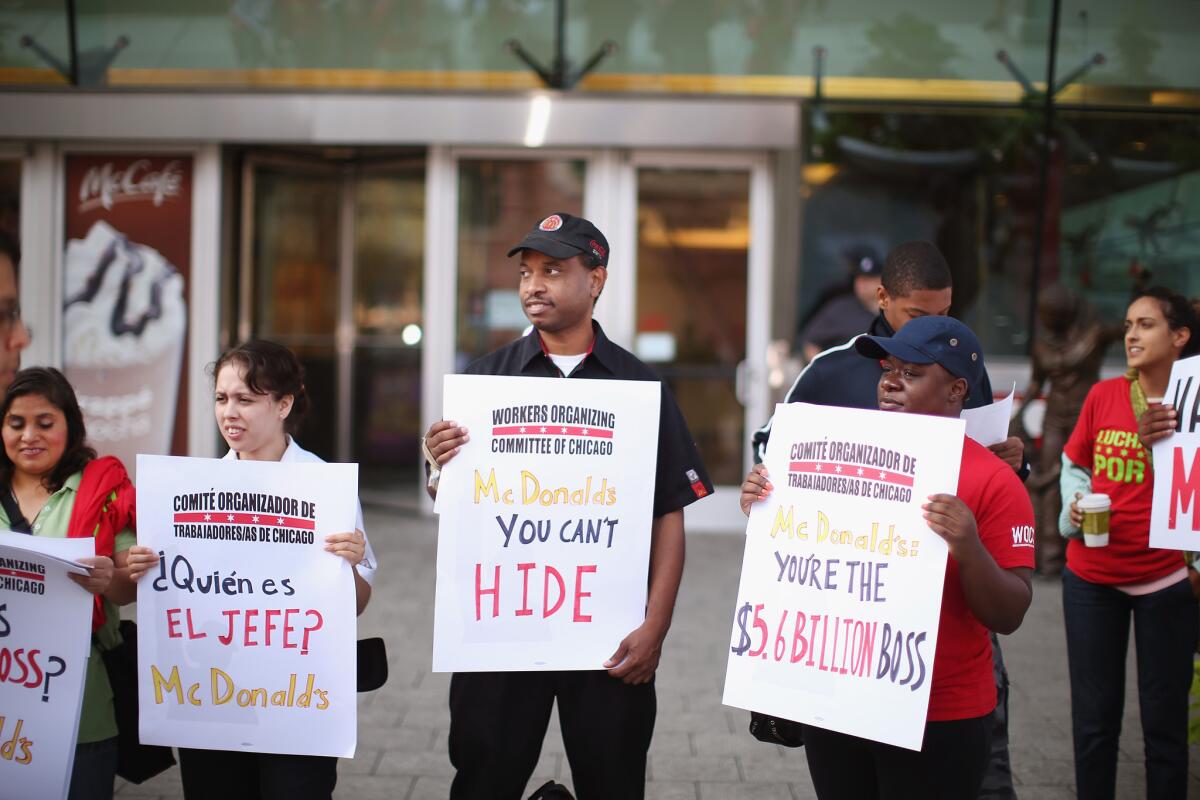The NLRB-McDonald’s ruling could be the beginning of a franchise war

- Share via
It has been accurately observed that a single sentence in a terse ruling issued last week by the general counsel of the National Labor Relations Board has the potential to bring U.S. labor law into sync with the 21st century.
The ruling involves at least 43 labor violation cases filed against McDonald’s since November 2012. (Another 64 are pending.) In those 43 cases, the general counsel ruled that it will treat McDonald’s as the workers’ “joint employer,” along with its franchisees. They can be judged jointly accountable for workplace conditions.
Thus with a single stroke did the agency punch a hole in the claim used by retailers and restaurant chains to dodge responsibility for their front-line workers: that working conditions are set by the small businesses operating the franchises, not by corporate headquarters.
This claim long has been transparently bogus. McDonald’s, like many other franchisors, exercises rigorous control over almost all aspects of a franchisee’s operations -- uniforms, food quality and preparation, store design, hours, prices. The branded company monitors these standards with secret shoppers, and backs them up with economic cudgels that can make indentured servitude look like a big party. A well-performing franchisee can be offered more stores, and a poor performer might find a competing store opening down the street.
(Just to be clear: A “franchisor” is the big company, such as McDonald’s; a “franchisee” is a smaller company, often a family enterprise, that operates one or more stores. The latter typically pays a fee to the the former and puts up his or her own funds to build the location, buy inventory and pay workers.)
The chains want to have things both ways. Their pitch to consumers is that the dining experience in one McDonald’s is virtually identical to another’s, but when the chips are down -- when a workplace regulation or a union organizing drive surfaces, for instance -- they claim that they just provide a big umbrella under which thousands of small businesses find some shade.
“Conceptually, this is a big step,” Catherine Fisk, a labor and workplace expert at UC Irvine law school, says of the NLRB counsel’s ruling. “It shows the general counsel is trying to adapt to the evolving nature of the restaurant business.” She cautions that the ruling has to travel a long road before it goes into effect, if it ever does: Among other things, the cases it applies to have to be adjudicated by the board and are subject to court reviews.
As for whether it will result in unionization of fast-food workers, which is the goal of the workers who brought the complaints to the NLRB, “that depends on whether they have the stamina and determination to organize their fellow workers.” But the ruling does point to the prospect that, if they do organize, “they can at least bargain with someone who can do something” about conditions -- that is, the big company.
The interests of the franchisors and their franchisees are constantly in tension. The danger of the NLRB counsel’s ruling is that while it might stick the big companies with responsibilities for workers, the big companies will stick the franchisees with the costs.
One example of how this works is playing out in the California Legislature, where a bill moving toward a vote aims to shift the playing field just a bit more in the franchisees’ favor.
The bill, SB 610, would narrow the conditions under which a franchisor can terminate a franchisee’s contract. If the franchisor violates those conditions, the franchisee can demand to be reinstated or receive damages that are more advantageous than under current law. The idea, says Peter Lagarias, a San Rafael attorney who represents franchisees, is to close loopholes in franchise law that have existed for decades.
So it’s perhaps unsurprising that the franchisors have organized to defeat the measure. Typically, they depict it as an attack on small business, but the names behind the anti-SB 610 campaign are companies like UPS -- which franchises out its UPS Store brand -- Round Table Pizza and AAMCO Transmissions.
Their beef with SB 610, they say, is that by making it harder to terminate underperforming operators it will hurt good franchisees, while encouraging unnecessary litigation.
The burning question is what will happen to the franchisor/franchisee relationship if labor laws and other regulations are more commonly imposed on the parent companies. Smaller franchisees might fall below minimum size requirements conferring immunity from minimum wage laws, the Affordable Care Act and other such measures; big franchisors won’t. But the franchisees might get the bill.
Fisk observes that apportioning the cost is typically within the control of the franchisor, which can set the price of its product. At McDonald’s, for example, the cost of higher wages or regulations “can be internalized within the cost of a Big Mac, so a franchisee doesn’t have to choose between honoring the franchise agreement or giving up his or her profit.”
Will the big companies be so accommodating? You can count on the tensions between them and their franchisees getting hotter.
Keep up to date with The Economy Hub by following @hiltzikm.
More to Read
Inside the business of entertainment
The Wide Shot brings you news, analysis and insights on everything from streaming wars to production — and what it all means for the future.
You may occasionally receive promotional content from the Los Angeles Times.











